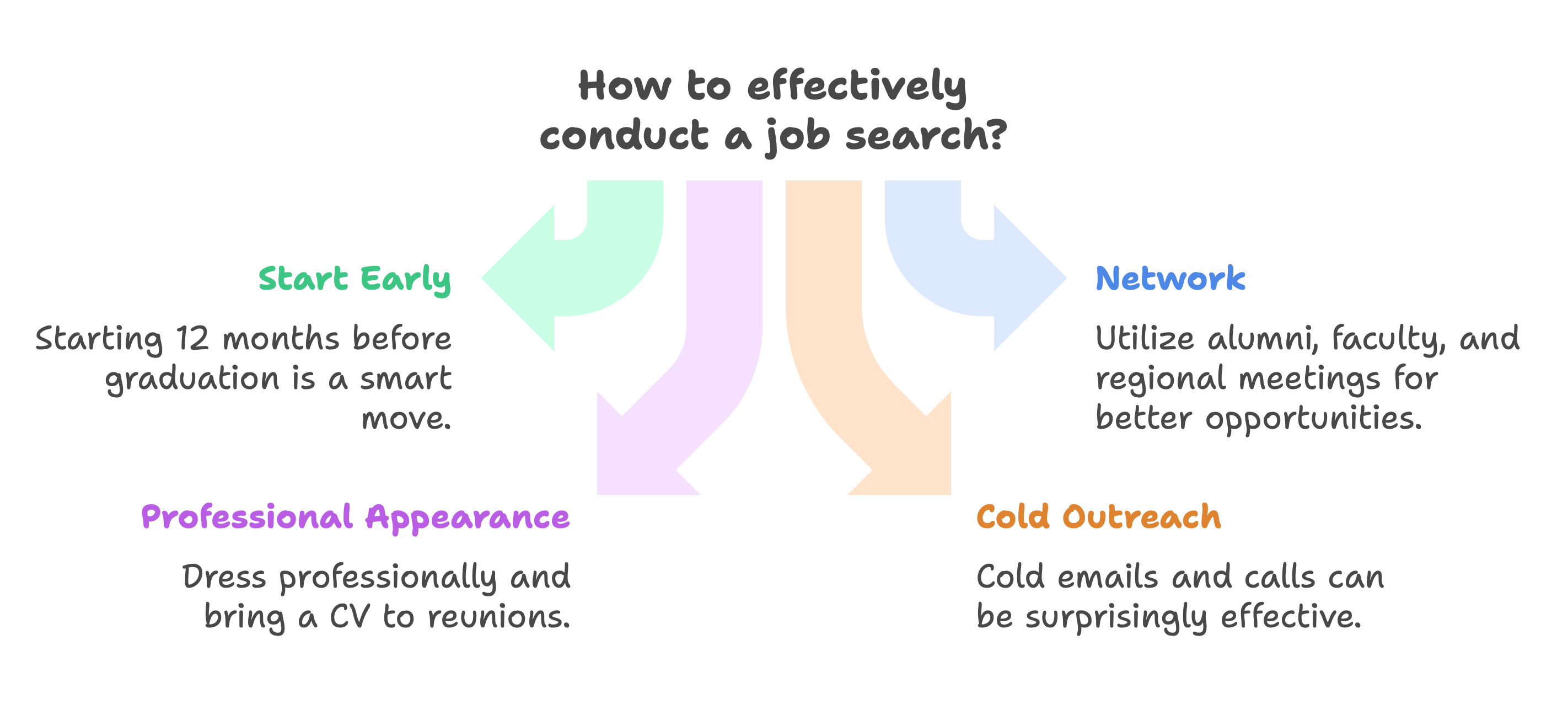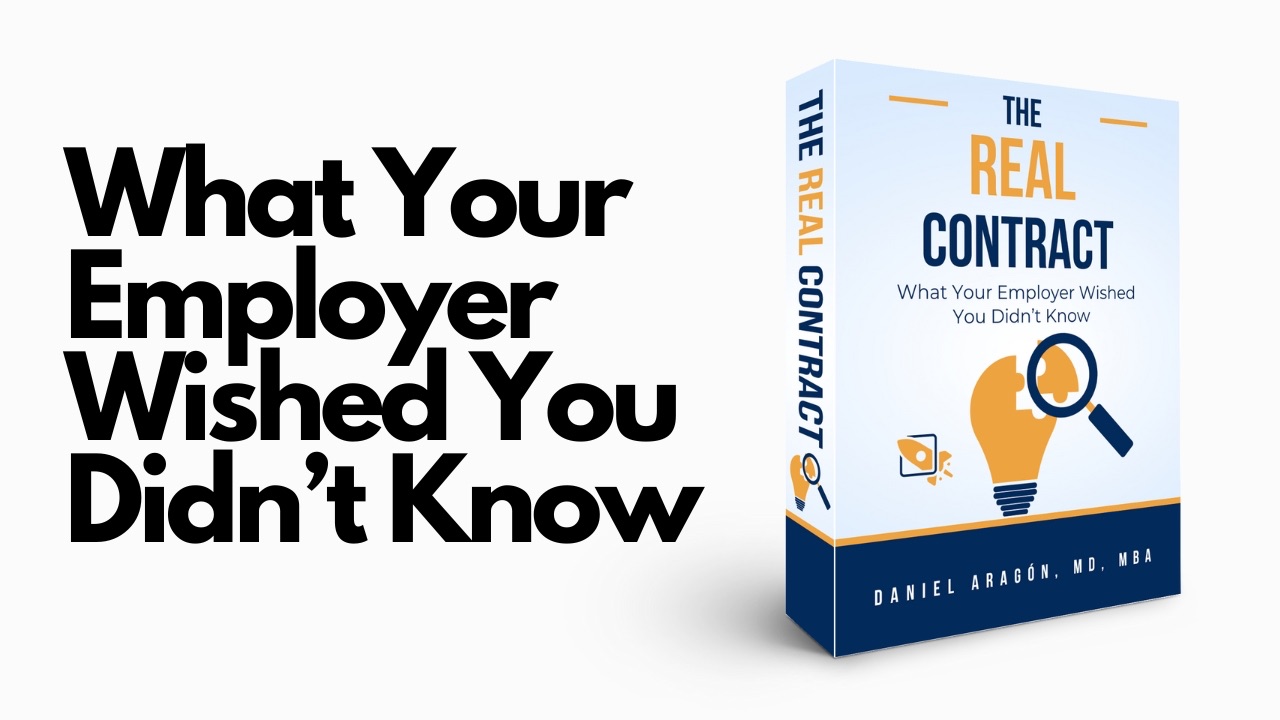
How to Find Your First Physician Job Without Stumbling Through It
🧠 Key Takeaways
-
You’re not “late” if you start 12 months before graduation, you’re smart
-
Use alumni, faculty, and regional meetings, they’re better than job boards
-
Don’t show up to a reunion in flip flops. Bring a CV
-
Cold emails and awkward phone calls work. Seriously.
-
Recruiters are a tool, not a strategy
-
Keep receipts. Track everything you do in your job search
🧭 Wait, Where Do We Even Begin?
Are you lost? Are you 9 months out from graduation, on call, eating a protein bar for dinner, and wondering where your first job is going to come from?
Cool. Welcome.
Before you panic, start here:
Who do you already know? Alumni, attendings, co-residents. These people know people and most jobs don’t get posted, they get whispered.
So ask yourself:
-
Have I emailed any alumni?
-
Have I asked my program director if they know of open positions?
-
Do I know which city I’m even trying to land in?
Pro tip: Read “12 Months Too Early? Why Starting Your Job Search Now Might Save Your Future”. It’s the punch in the face you didn’t know you needed.
👩🏽⚕️ Who’s In Your Alumni Network, and Why Aren’t You Calling Them?
Do alumni actually help? Yes. Should you feel weird reaching out? Also yes. Do it anyway.
Alumni can:
-
Open doors
-
Set up interviews
-
Pass your name along
-
Tell you where not to go
What should you bring to the conversation?
-
A 2-sentence intro
-
Your CV or LinkedIn link
-
A simple ask like: “Do you know anyone looking in XYZ?”
And yeah, if you show up at an alumni mixer, be ready. That might be your interview.
🏥 Faculty: They Know More Than You Think
It’s weird how many residents forget this one. Your current attendings know people. Even if they haven’t practiced outside your hospital in a decade, they know who’s hiring.
So ask them. Ask them where grads went. Ask who they trust. Ask who to avoid.
It takes one call from an old med school roommate to get your name bumped to the top of a shortlist. Let your faculty help you get that call made.
Also: Read this on understanding who’s actually hiring you.
🖥️ Job Boards Are Fine. Just Not Enough.
Everyone’s gone to GasWorks or PracticeLink. You probably have five open tabs already. And sure, healthcare.monster.com and doccafe.com have jobs.
But here’s what you gotta know:
-
The good jobs? They get filled before they’re posted.
-
The ones online? Often less desirable, harder to fill.
-
The recruiters emailing you? They’re pushing spots they need to place. Not always what’s best for you.
Online boards should be a tool, not your plan.
📍 Go to the Meeting. Not Just Any Meeting, That One.
Live in Texas but wanna work in Boston? Go to a regional conference in Boston. You’ll meet employers who are looking in that area.
Big national meetings also matter. The exhibit halls, the reunions, even the after-parties. Jobs are hiding in all of it.
Bring:
-
CVs
-
Business cards
-
A one-liner pitch
-
Shoes that don’t kill your feet
You don’t need to be fancy. You need to show up, shake hands, and follow up.
📞 Cold Calling Still Works? Seriously?
You’re gonna hate this, but yeah.
Sometimes the best way to find a job is to pick up the phone and call a practice directly. Especially if you’ve narrowed down a city or region and there’s no obvious listing.
What to say?
“Hi, I’m finishing my residency in [specialty]. I’m interested in opportunities in your area. Would you mind connecting me with someone on the hiring team?”
Is it awkward? Kinda.
Does it work? A surprising amount of the time.
🧑🏾🤝🧑🏻 Co-Residents Know Stuff. Ask Them.
They don’t have to be your best friend. They just have to know a recruiter, a job post, a guy who knows a guy.
And they probably do.
Say this:
“Hey, are you looking at any jobs in [location]? Have you talked to any groups out there?”
Half of them have leads they’re not even using. Ask.
👨💼 Recruiters Are a Tool. Not Your Strategy.
You’ll get 400 recruiter emails in the next 6 months. Some will be helpful. Some will not.
Here's the truth:
-
Recruiters fill hard-to-place jobs
-
Some come with nice signing bonuses
-
A few can be your biggest advocate
But… they work for the employer, not you. So don’t expect them to prioritize your long-term goals.
For a deeper dive on negotiation dynamics with recruiters and employers, check out this breakdown of common physician contract mistakes.
🎓 Before You Say Yes to Any Job, Take This Course
Before you review your offer.
Before you talk to a lawyer.
Before you let the recruiter sell you on “tail is covered.”
You gotta know the basics. You gotta spot red flags before you walk into them.
👉🏽 The Real Contract Course is a 2-hour video that walks you through the contract stuff nobody teaches. It’s made for residents and fellows. It’s no fluff. Just real examples. Real mistakes. Real advice.
What you’ll get:
-
Clarity on stuff like non-competes, tail coverage, and termination
-
A short list of what to ask your lawyer
-
A real edge in negotiations
You're smart. Don't guess. Be ready.
FAQs
Q: How early is too early to start my job search?
A: If you're less than 12 months out, you're already right on time.
Q: What if my program doesn’t have a strong alumni network?
A: Use association meetings or faculty connections to branch out. You’ve got more access than you think.
Q: Are recruiters sketchy?
A: Not usually. But remember, they’re not your agent. They’re doing a job for someone else. Use them wisely.
Q: Should I work locums while I search?
A: Depends. But some folks turn those short gigs into full-time offers, and for some, it's a sweet stopgap with money perks.





